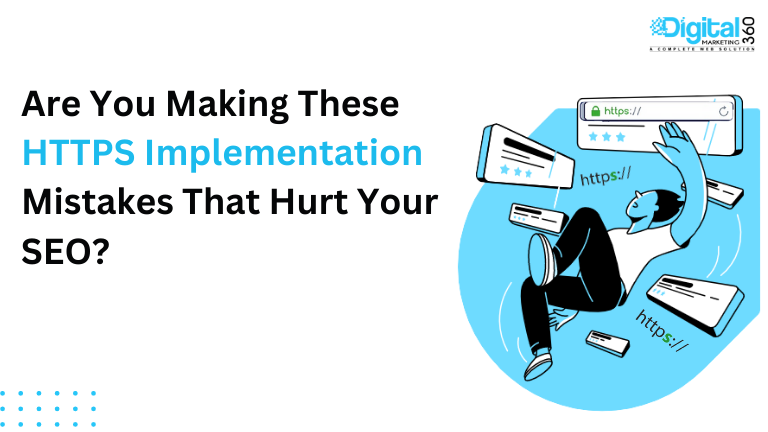Are You Making These HTTPS Implementation Mistakes That Hurt Your SEO? – It’s the first half of 2023 and if you’ve had an online presence for at least 3 months now, you may have learned one thing – securing your website with HTTPS is a lifesaver!
Table of Contents
ToggleCyber-attacks have had the best of visitors online over the past few years and now they are more than wary of opening a website that isn’t secure, especially if it involves entering personal information.
Users know way better now than to trust an HTTP website. And Google announced that website security is even a ranking factor. Clearly, you need that HTTPS lock icon on your URL to get your customers and Google to trust you.
However, we found that a lot of websites encounter massive glitches when they implement HTTPS. And these glitches work against them in SEO, therefore deceiving the whole purpose.
Here are 5 common HTTPS implementation mistakes that we have seen websites make that hurt their chances of ranking.
5 HTTPS implementation mistakes you may unknowingly be making that negatively affect your SEO
Not paying attention to internal links that lead to HTTP pages
One of the most common mistakes that website owners make after converting to HTTPS is leaving internal links and scripts unaltered. Once your site has been converted to HTTPS you must by all means make sure that all links, images, and scripts point to HTTPS versions. This is especially true if you haven’t implemented HSTS or set up any redirects. Such a mismatch will send a message to the user warning them about the site using unsecure elements which reflects poorly on your company. Ultimately, this brings down your traffic, which in turn, negatively impacts your SEO.
Not paying attention to Security Certificate issues
SSL certificates help build trust and security, which plays a big role in forming long-lasting customer relationships. It essentially establishes a secure connection between the server and the browser which makes sure that no data entered into the website gets stolen. This is particularly important if you have a page that collects a password from the user.
Now, it is not enough that you register for SSL and forget it. You must pay attention to its expiry and renewal. An expired SSL certificate again, will send a warning message to a user trying to open your website. And most users refrain from going forward, on receiving a message like that. Ultimately this affects your organic search traffic and in turn, your ranking.
Another rookie mistake associated with SSL that companies very often make is not paying attention to the domain name when registering. Address mismatches between the registered SSL certificate and the address bar of your website will block users from entering your website, yet again affecting your credibility and traffic. And credibility happens to be one of the main ranking factors for search engines, failing which your site falls on the dark side of SEO.
Incorporating too much-mixed content with no security
When switching to HTTPS, companies often include too many elements like images, iFrames, and scripts and leave them unsecured. This can also lead to overall security issues. A website that contains too many HTTP elements is not trusted even if you have made the switch to HTTPS. Warnings will still be given to users about insecure elements, leading to skeptical users and lesser traffic. This, in turn, brings down your chances to rank.
Not using SNI support for your server
Server Name Indication or SNI is an important part of the TLS Protocol which allows companies to support more than one server and host multiple certificates under the same IP address. A lot of companies fail to utilize this support.
However, SNI must be used to enhance trust and security on the part of users. It gives more confidence to the audience and in the long run, contributes to lasting relationships. As mentioned before it highlights credibility, which gives the green flag for search engines to rank your website.
Not complying with server guidelines or DSS issued by PCI
According to prescribed Data Security Standards (DSS) issued by the PCI Council, old TLS 0.1 (Transport Layer Security) and SSL versions should not be used after 30 June 2016. Companies that use TLS 0.1 and SSL protocols should therefore upgrade to the latest versions without fail. However, most companies sleep on this, letting a simple server compliance issue negatively affect all their SEO efforts.
In addition to the above, companies also need to exercise good judgment when implementing HTTPS. As discerning website owners it is always a good idea to encrypt your website for the safe exchange of data, especially if you take users’ personal information. Surprisingly enough, according to a SEMrush Site Audit report, around 9% of companies still even have non-secure password input pages.
These things severely impact the trustworthiness and security of your website, and the less secure your website is, the lesser your chances of ranking.
Bottom line
Implementing site encryption is definitely the way to go in 2023. However, you need to be more mindful of the changes occurring to the site elements. You must also keep yourself updated with the latest software and SSL upgrades to implement timely compliance requirements.
These are mistakes that can go unnoticed.
Check your website for these crucial errors now.
Call our experts to conduct a quick site audit to ensure you are not on the dark side of SEO.
Read our article: SEO Content Writing Tips That Can Help You Beat Your Competitor







